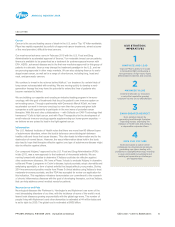Pfizer 2014 Annual Report Download - page 12
Download and view the complete annual report
Please find page 12 of the 2014 Pfizer annual report below. You can navigate through the pages in the report by either clicking on the pages listed below, or by using the keyword search tool below to find specific information within the annual report.
PFIZER ANNUAL REVIEW 2014 www.pzer.com/annual 12
ANNUAL REVIEW 2014
Pzer has a number of biologicals and small-molecule candidates in early development
for treating dementias, including a new approach to Alzheimer’s that may improve how
nerve cells signal each other inside the brain. We are also developing a compound,
already designated as an Orphan Drug by the FDA, that may prove useful in treating
Huntington’s, a rare devastating inherited dementia.
We also have promising early-stage research aimed at developing a dopamine
modulator useful against Parkinson’s disease. Based on our early studies, we believe
this therapy could provide longer-lasting motor benets for people suffering from
Parkinson’s compared to existing treatments. We believe this research has the potential
to meaningfully reduce the burden of Parkinson’s and improve the quality of life for
Parkinson’s patients.
People with chronic pain represent one of the most under-served patient groups in the
world. Prescription opioids are an important treatment option for patients in chronic pain.
However, the misuse and overuse of opioids is a serious societal concern. In 2014 the
FDA approved an updated label for Embeda,® an extended-release morphine that we
have re-launched, to reect properties that are proven to reduce the potential for abuse.
In addition, early this year the FDA accepted for review our application for a marketing
authorization in the U.S. for ALO-02, an extended-release oxycodone hydrochloride
medicine that is designed to reduce abuse.
Rare Diseases
It is estimated that as many as 10 percent of people have a rare disease, of which more
than 6,000 have been identied to date. These diseases most often seriously affect
children under ve. A number of these diseases are progressively fatal.
We have built a strong non-cancer rare disease portfolio of 12 medicines approved
worldwide that treat rare diseases in the areas of hematology, neuroscience, inherited
metabolic disorders and pulmonology. In the near term we are helping patients manage
their disease and improve their quality of life. We also have longer-term work that is
exploring how to correct certain rare diseases by studying the underlying causes of the
disease. A few examples of our work in this area include:
• Myostatin, entering Phase 2 for Duchenne Muscular Dystrophy, a progressive and
generally fatal disease
• Tafamidis, for adults with symptomatic transthyretin cardiomyopathy, an always-fatal
heart condition, in Phase 3
• Rivipansel, which is being developed through a licensing agreement with
GlycoMimetics, Inc., for vaso-occlusive crises of sickle cell disease. These crises
cause excruciating pain and distress for patients, who often require hospitalization.
Collaboration is essential in nding new approaches to treating rare disease. In 2014,
we helped form the Rare Disease Consortium, with agreements between certain
U.K. universities and academic health centers and Pzer, bringing together a range
of skills and technologies needed to speed up the ow of potential new therapies.
We also expanded Pzer’s rare disease R&D competencies through an agreement
with Spark Therapeutics, Inc. to investigate a gene therapy approach for hemophilia
B. If successful, such an approach would actually replace genes that are not working
properly. In addition, in late 2014, we entered into an agreement with OPKO Health, Inc.
to co-develop and commercialize a long-acting human growth hormone for patients with
Adult and Pediatric Growth Hormone Deciency. This has the potential to be the rst
innovation in growth hormone therapies in 20 years.
CEO Letter > Letter to Stakeholders
CEO LETTER
























